
 Post Category - WellnessWellness - Post Category - HealthHealth
Post Category - WellnessWellness - Post Category - HealthHealthNursing can be a wonderful bonding experience…and it can also be a painful source of stress. How do you know when to stop breastfeeding?
Throughout World Breastfeeding Week at Sassy Mama HQ we’ve been celebrating all that’s wonderful about breastfeeding: it provides amazing nutrition for babies, it’s a beautiful bonding experience, and it’s both FREE and healthier for the environment. But eventually, every mama and child’s breastfeeding journey comes to an end. So how do you know when it’s the right time to stop breastfeeding (AKA weaning)?
Of course there’s no one right answer – and you should never feel pressured by societal “norms” – but there are important physiological and psychological considerations for both mama and baby to take into account. We spoke with two leading Singapore breastfeeding advocates – paediatrician Dr. Natalie Epton of SBCC Clinic, and Midwife/Lactation Consultant extraordinaire Uma Thambidurai of Mother & Child – for their expert advice. From signs to look for to know when your child is ready to start weaning, to tips on how to safely start cutting down on feeds, they’ve got you covered, mamas!
We also got real mamas to share their own experiences with breastfeeding (and when to stop) below. To illustrate the point that there is no one universal way to stop breastfeeding, you’ll note that mamas with two kids ALL had different experiences between baby #1 and #2!
Paediatrician Advice from Dr. Natalie Epton
Expert Tips from IBCLC/Midwife Uma Thambidurai of Mother & Child
Real Mama Stories of Stopping Breastfeeding
Expert Advice: The Benefits of Breastfeeding & How to Stop Safely
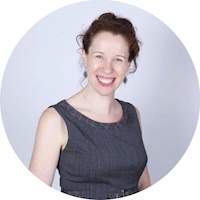 We spoke with paediatrician Dr. Natalie Epton about why health experts recommend breastfeeding exclusively to six months of age, and the benefits of breastfeeding up til age 2 if possible.
We spoke with paediatrician Dr. Natalie Epton about why health experts recommend breastfeeding exclusively to six months of age, and the benefits of breastfeeding up til age 2 if possible.
Why should mamas try to continue to breastfeed even after solid foods are introduced?
Multiple world scientific organisations, including the WHO, UNICEF, the American Academy of Pediatrics and The British Royal College of Paediatrics and Child Health (RCPCH) recognise the scientific evidence from multiple studies showing reduction in childhood infections, improved metabolic outcomes (reduction in risk of childhood obesity, type two diabetes and cardiovascular disease) from prolonged breast feeding, as well as improvements in verbal IQ scores (although not Math, unfortunately!).
Breast milk is a phenomenal substance, continuing to develop and evolve with your child as he grows- the fat and protein components change with his changing requirements, as do the immunoglobulins and factors that help protect against infections.
The act of breastfeeding is calming for both the child and the mother: for mom it’s an opportunity to sit and take a time out in a busy and frantic day. The oxytocin, or love hormone, released during nursing helps protect mom from postnatal depression (which isn’t just a risk in the early months following delivery — many moms have delayed onset of PND several months afterwards).
Is there a ‘typical’ age when babies stop breastfeeding?
Although breastfeeding up to two years is regarded as the “gold standard”, some babies self-wean at some point in the second year of life. If this happens, try not to be distressed. Regard it as a natural end to a period in your child’s life, and seek to fill the gap with other activities that give you and your baby that sense of close bonding and peace- a favourite book whilst snuggling in a rocking chair perhaps.
Any tips for mamas who are ready to end their breastfeeding journey?
If you need to bring breastfeeding to a close, due to medical reasons or a desire to ovulate and get pregnant again, then talk to your doctor about the optimal timing. Dropping feeds slowly to prevent engorgement and reduce the risk of mastitis needs to be planned, and is dependent on the age of the child and the number of feeds.
By two years of age, most breastfed children are taking two to three feeds per day. I would suggest first dropping the midday feed, then the morning feed, and finally the evening feed over the course of a few weeks. Remember to replace the dropped feeds with fresh milk, as children still require around 400-500ml of milk per day until at least the age of 5 years as their calcium requirements remain high.
When did YOU stop breastfeeding?
My own children nursed until around two and a half years each. We gently dropped to just one feed in the evening, then I explained that they were a big boy/girl, and we were going to stop now. They were very receptive to being “big”! And they were more than happy to exchange nursing for The Gruffalo!
Advice from IBCLC/Midwife Uma Thambidurai on Self-Care & Preparing to Stop Breastfeeding
 The breastfeeding journey between a mother and baby is uniquely special. The length of breastfeeding is entirely dependent on the mother and her baby. The mother may be ready to wean but the baby is not, or vice versa.
The breastfeeding journey between a mother and baby is uniquely special. The length of breastfeeding is entirely dependent on the mother and her baby. The mother may be ready to wean but the baby is not, or vice versa.
The mother should never be pressured by society or family members to wean. It’s her decision entirely, and her baby’s.
How can mothers prepare mentally to end their breastfeeding journey?
The mental state of the mother is often over looked as she struggles with her decision to wean. She may feel feelings of grief, sadness, being tearful, has anxiety and has feelings of irritability in the short term. If these symptoms persists long term she should seek the help of a perinatal counsellor to help her overcome her feelings of grief as this may sometimes lead to postnatal depression.
Are there readiness signs to watch for in a child?
The child may sometimes decide to wean abruptly, or over a period of time. They may demand less direct latching and become more dependent on the bottle for feeding. This is sometimes due to the mother’s milk supply reducing, perhaps due to irregular pumping after she has returned to work.
What physical steps should a mama take as she prepares to stop breastfeeding?
The recommendations are that the mother works closely with an experienced lactation consultant during the weaning process to make the transition smooth, gentle and successful. Once the mother has made the decision to wean she should consider trying a new bedtime routine that include bonding routines such as massaging her toddler, singing, reading and lots of cuddle time to fill the gap of the breastfeeding routine.
Methods of weaning by the mother could include gently reducing her milk supply, or cutting back on the number of breastfeeds she offers her baby over a period of time. The general rule is: Do not offer, do not refuse.
Mamas Share When They Stopped Breastfeeding Their Kids
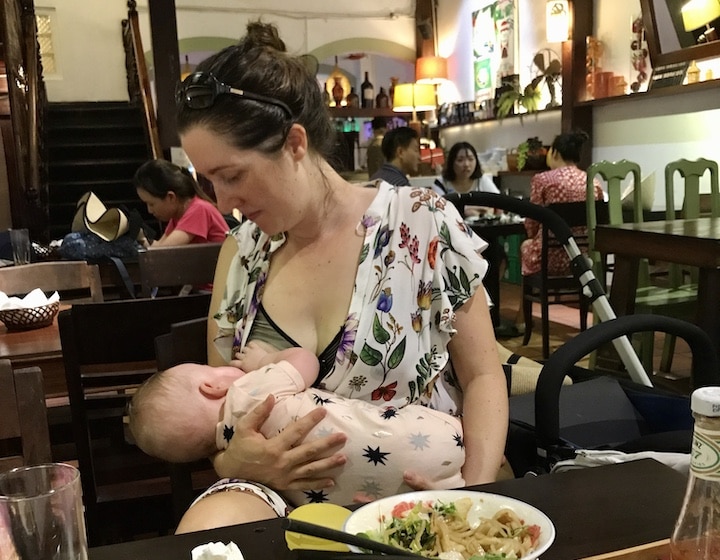
I was lucky enough to have an abundance of milk, but both my babies had trouble latching, so with the support of lactation consultants – thanks Uma and Mother and Child! – I used a nipple shield both times. My first baby fed like a newborn (at least overnight) for the first year of his life and had the cheeks to show for it! I finally got sick of the overnight feeds around 12 months and slowly cut him off, but he responded by refusing day feeds. So we had an abrupt end to our feeding journey at around 14 months, but I was so exhausted that I didn’t mind! My second baby was much less voracious, and casually dropped feeds on her own at around 12 months. I still remember my last attempt at feeding her, where she just laughed and laughed at my nipple!
— Jessica (kids now 7 & 3 years)
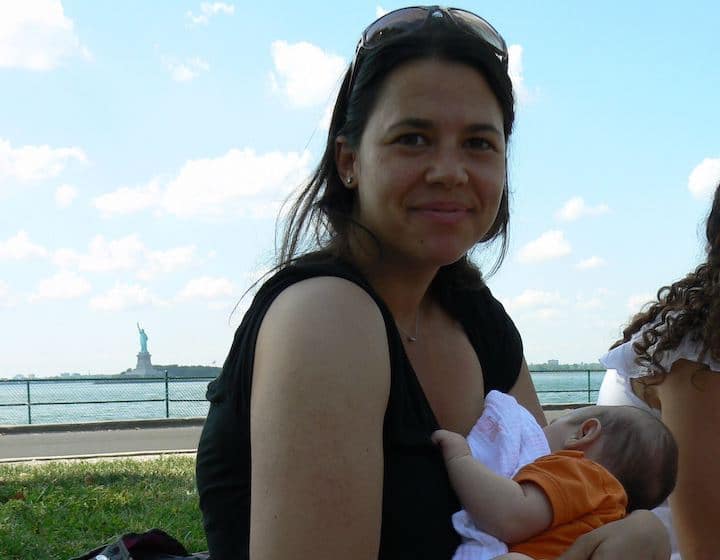
My goal was to breastfeed for 1 year so that I could avoid formula all together and go straight to cow’s milk. As I approached the one year mark it became very clear that my little one had NO interest in weaning and was actually more attached to the boob than ever. He was eating solids well and nursing mostly for naps and bedtime, so it worked for us both and we continued for another year. It was never easy to put him down for bed so nursing was my best (and only) tool. By two he was easier to distract with books and stories and cuddles so he eventually stopped asking for it. My second was very different. He latched on more easily and had a smoother start than my first, but by the 1 year mark, he was over it and when he got his first taste of cow’s milk, he was in love. He started turning away from the nipple in protest and would happily cling on to his little bottle of milk. He also sucked his thumb and had a special lovey for bedtime so he relied on my boob for comfort less than my first. He was a great sleeper so this was all a welcome relief! I felt that I had a strong cuddly bond with both of my boys, gave them a good start to gut health, and after three consecutive years of nursing, I was quite happy to be done!
— Marisa (kids now 11 & 8 years)

I struggled with breastfeeding my firstborn so I was extra-determined with my second one. Things got off to a good start and finally I became one of those people who breastfed. My baby was happy, I was happy and I was ready to keep going till at least the 12 month mark. Alas sometimes we don’t get to decide. When he was around 8 months old, he decided he wasn’t so interested in my boob anymore. Don’t think it was nipple confusion cos he would only get a bottle once per day or less. He was just done. So really sometimes the baby just decides!
— Nadia (kids now 9 & 20 months)
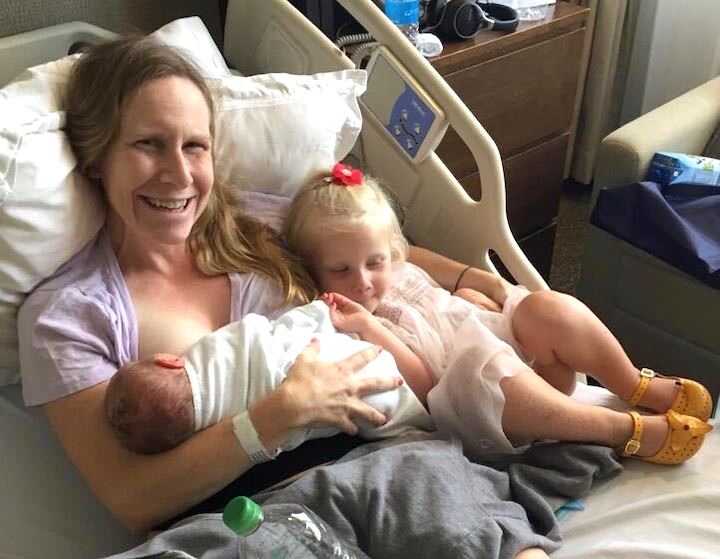
When I had my first baby, a well-meaning person told me, “If the kid is able to ask for it, it’s time to stop breastfeeding!” I’m happy to say we did not go that route! My first baby loved nursing and engaged in marathon feeds (like, 30-45 minutes at a clip) for her first year of life. Between 18 months and age 2 we cut down to maybe around two feeds per day (mainly just at naptime, always on long airplane flights, and for a cuddle before bed) — and she did love to ask for it (she called nursing “num-num”). Right around her second birthday, my milk supply seemed to lessen, so nursing became more of a bonding experience than anything else. I matter-of-factly let my daughter know that I had no more “num-num” left, and she totally took it in stride. With #2, I always joked that he was ruthlessly efficient — his feeds NEVER lasted more than 15 minutes, and yet he was off the charts for weight within his first month of life (and still is nearly three years on!). He showed an early interest in solid foods at around 5 months, and by 14 months he refused to nurse, even at bedtime. Like Marisa’s son, he’s a thumbsucker and has a beloved blankie so I think he needed the comfort less. It was an abrupt and rather sad ending to my breastfeeding journey (for me), but I feel grateful to have had such a positive experience with both my kids, and that we made it past my self-determined one-year goal. Nursing has its challenges (UGH I hated those early days, except for the lactation cookies), but has been perhaps the most purely beautiful and rewarding part of parenthood for me so far.
— Kate (kids now 6 & almost 3)
Thank you so much to Dr. Epton & Uma Thambidurai for sharing their wisdom and expertise. Be sure to reach out to them if you have any further questions, mama. And know that we are always here to support you on your journey with our ultimate guide to breastfeeding resources in Singapore. You got this!






 View All
View All
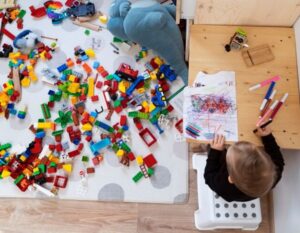




 View All
View All









 View All
View All



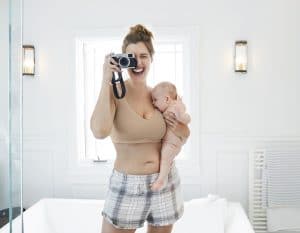



![[𝗦𝗔𝗩𝗘 𝗧𝗛𝗜𝗦] 𝗙𝗿𝗲𝗲 𝗔𝗰𝘁𝗶𝘃𝗶𝘁𝘆 𝗙𝗼𝗿 𝗞𝗶𝗱𝘀 𝗪𝗵𝗼 𝗟𝗢𝗩𝗘 𝗙𝗶𝗿𝗲𝘁𝗿𝘂𝗰𝗸𝘀! 🚒🔥
Skip the usual mall stroll and check out the Civil Defence Heritage Gallery! It’s free, air-conditioned, and housed in Singapore’s very first fire station, just across from Funan Mall.
Spanning two full floors, the gallery dives into Singapore’s firefighting history, major rescue missions, and the evolution of the SCDF. There are interactive exhibits, immersive displays, and even emergency preparedness tips for the public.
Bonus: Selected fire stations also host Saturday morning open houses with guided tours where you can watch fire gear demos, meet firefighters, and see those high-pressure water sprays in action!
𝗛𝗼𝘄 𝗺𝘂𝗰𝗵? FREE
𝗪𝗵𝗲𝗿𝗲? 62 Hill St, Singapore 179367
𝗢𝗽𝗲𝗻𝗶𝗻𝗴 𝗵𝗼𝘂𝗿𝘀? 10 am–5 pm (Closed on Mondays)
Comment “Fire” or link in bio for more details!
Tag your parent crew and plan your next adventure with the little ones! 👨👩👧👦💥
.
.
.
.
.
.
.
#SGFireStation #SCDFGallery #ThingsToDoWithKidsSG #FreeFamilyFun #SGParents #KidFriendlySG #FiretruckLovers #MuseumAdventure #SCDF #HeritageGallery #SGMums #FamilyWeekendSG #LearningThroughPlay #SingaporeWithKids](https://www.sassymamasg.com/wp-content/plugins/instagram-feed/img/placeholder.png)
